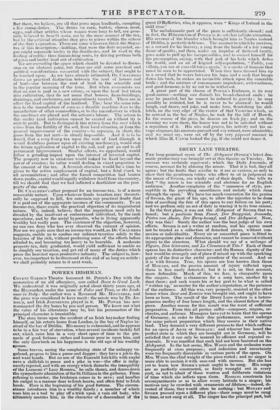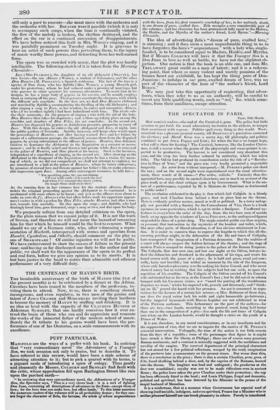DRURY LANE THEATRE.
THE long-promised opera of The Alchymist (Spotlit's latest dra- matic production) was brought out at this theatre on Tuesday. Its success was certainly equivocal ; which the Daily Journals, of course, account for by abusing the music. That it is bad, they all agree ; but the faults they ascribe to it are so various, as only to show that the gentlemen critics who affect to sit in judgment on the music of SPOHR, are wholly out of their depth. One tells tis that " the music is too scientific and abstruse for an English audience." Another complains of the " sameness of style, per- ceptible in the pervading smoothness and melody which runs through the opera." We have too much veneration for the genius of SPOHR, the giant of his age, to allow the injustice to be done him of ascribing the fate of this opera to any failure on his part; and we perform only an act of duty in tracing it to its true causes.. In the first place, it was not the Alchymist of SPOHR that we heard; but a pulled° from Faust, Der Berggeist, fessonda,. Pietro von Abano, Der Zwey-kampf, and Der Alchymist. Now, why was this? Surely the author was the best judge of his own effects. SPOHR is not a writer at random, and his operas must not be treated as a collection of detached pieces, without con- nexion or individuality. Every air or concerted piece is fitted to its appropriate place and character, and cannot be removed without injury to the structure. What should we say of a mélange of Fr;s7aro, Don Giovanni, and La Clemenza di Tito Each of these operas has its distinctive character ; and the Roman dignity of the last would be strangely out of place if mixed up with the sparkling gaiety of the first or the awful grandeur of the second. And so it is with SPOHR. True, his, operas are less known than those of MOZART, and the precise amount of injury inflicted upon them is less easily detected; but it is not, on that account, more defensible. Much of this, we fear, is chargeable upon the singers. One is clamorous for a song here, another for a duet there; and each wants his or her part to be what is called "written up," no matter for the author's reputation, or the patience of the audience. All this was, very properly, resisted at the other house when Azor and Zemira was brought out, and ought to have been so here. The result of the Drury Lane system is a hetero- geneous medley of four hours length, and the almost failure of the piece. Another reason for this result was the want of sufficient preparation. From this all parties suffer—composer, singers, or- chestra, and audience. Managers have yet to learn that the operas of Germany, in order to their due performance, must undergo the same patient preparation which they receive in their native land. They demand a very different process to that which suffices for an opera of ARNE or STORA.CE ; and whoever has heard the perfect state in which they are brought out in Germany, will be satisfied that it can only be insured by efficient and repeated re- hearsals. It was manifest that such had not been bestowed on the Alchymist. In the last scene, Mrs. WOOD and the orchestra were frequently at cross purposes; and indecision and uncertainty were too frequently discernible in various parts of the opera. On Mrs. WOOD the chief weight of the piece rested; and no singer is more able to sustain it with ease and with success. But she has yet to learn how SPOHR'S music ought to be sung. us songs are so perfectly constructed, so finely wrought out in every part, as not to admit of those wanton and deliberate violations of time which she inflicts upon them. ROSSINI.constructs his accompaniments so as to allow every latitude to a singer; his motivos may be crowded with ornaments ad libitum,—indeed, di- vested of these, they would often be nothing : but MOZART and SPOHR proceed upon a different plan—their songs must be sung in time, or not sung at all. The singer has the principal part, but still only apart to execute—she must move with the orchestra and the orchestra with her. But even were it possible (which it is not) to accompany such songs, when the time is continually violated, the flow of the melody is broken, the rhythm destroyed, and the effect on the ear is a continued succession of disappointments. "We have before noticed this fault in Mrs. WOOD'S singing, and it was painfully prominent on Tuesday night. It is grievous to hear an artist of such powers thus perverting them, to the injury of music worthy those powers, and detracting from her well-earned fame.
The opera was so crowded with music, that the plot was hardly intelligible. The following sketch of it is taken from the Morning Chronicle— Inez (Miss PEArtsoN), the daughter of an old alchymist (Src niN), has two lovers—the one Alonzo (Wool)), a student of Salamanca, and the other Don Ramiro (H. Pmr.i.irs), a Spanish nobleman. The last of the two is a species of Don Juan, who has Sybil& (34,4. Woon), a young Moorish girl, under his protection ; whom he had seduced under a promise of marriage, but who pursues in other quarters his amorous adventures. To assist him in his designs, he has a large body of gypsies in his service, and he usually employs 'them in carrying off his prey. These persons constitute the choruses, with which the different acts conclude. In the first act, we find Don Ramiro (followed and watched by Sybil/a), reconnoitering the dwelling of the old Alchymist ; and after singing a -song to Inez, at her window, he enters and encounters Alonzo, who (if we recollect rightly) had been beforehand with him. The rivals sub- due their animosity, for the purpose of singing a trio with the aid of the lady. Don Ramiro then takes his departure; and a blow-up taking place among the crucibles and alembics of Don Felix, the act concludes.. in the second act, Ramiro has disguised his gypsies as Andalusian peasants, purposing to carry off Inez. With this.design, lie entices the old Alehymist and Inez, at night, into the public gardens of Grenada. Sybil/a, however, still keeps close watch upon the proceedings of Ramiro ; and after having warned Inez and her father, by means of a subterranean passage, she ultimately rescues them from the disguised gypsies, by giving information to the officers of justice. Ramiro, thus defeated, resolves to denounce the Alchymist to the Inquisition as a sorcerer or necro- mancer; and he is finally seized and thrown into prison, while Inez is conveyed to the palace of Ramiro, and thus placed at his merry. Such is the business, independent of a superfluity of singing, in the second act. After showing us the Akliymist in the dungeons of the Inquisition (where he has a vision, the mean- ing of which, as we -did not comprehend, we shall not attempt to explain), we are .introduced to a ball at the palace of Ramiro ; where he vainly endeavours, by promises of eternal love and threats against her father's life, to make a favour- able impression upon Inez. Among other extravagant nonsense, he tells her- " For speckling gems, the sup outshining,
war with earth—I'll search the sea!
And when I've wrowrht the starry eestus, Its magic blaze shall circle thee."
As she remains firm in her virtuous love for the student Alonzo, Ramiro .orders the criminal proceeding against the Alchymist to be continued : he is condemned with some others to he burnt ; and just as the officers were about to Make an auto da .1:4%,. Alonzo (who had often befiire made his opportune appear- ance) rushes in with a pardon for Don Felix, attacks Ramiro, and after a con- test, wounds him mortally. He dies upon the stage ; and Sybilla, who had doatingly loved him, goes distracted, sings a song or two, and dies upon his body.
We purposely refrain from any detailed criticism on the opera, for the plain reason that we cannot judge of it. It is not the work of SPOHR, and therefore we will not incur the hazard of censuring him for that which he himself would be the first to censure. What should we say of a German critic, who, after witnessing a repre- sentation of Macbeth, interspersed with scenes and speeches from Hamlet, Cgmbeline, and Othello, should comment on the play as one of SHAKSPEARE ? Of similar injustice we will not be guilty. 'We have endeavoured to show the causes of failure in the present case; and having so far discharged our duty to the author and the public, we shall wait for the appearance of the opera in its perfect and real form, before we give any opinion as to its merits. It is but bare justice to the band to notice their admirable and, efficient performance of a very difficult duty.



























 Previous page
Previous page